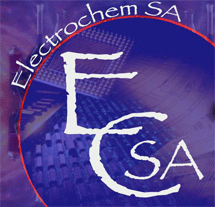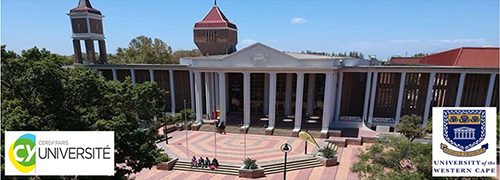

PRESENTS: 2ND SENERGYLAB WORKSHOP ON RECENT ADVANCES IN
SENSORS AND
ENERGY DRIVEN APPLICATIONS AND
ELECTROCHEMISTRY MASTERCLASS SERIES 1
WRASEA and EMS1 11 - 12 April 2024

SenErgyLab is an International Associated Laboratory between SensorLab at The University of the Western Cape, South Africa and LPPI (Laboratoire de Physicochimie des Polymères et des Interfaces) at CY Cergy Paris Université, Cergy Pontoise, France. The SenErgyLab focuses on developing advanced new semiconductive and conductive nanomaterials needed for applications in the areas of sensors and energy.
SensorLab research group is an electrochemistry research group that focuses on the fundamental and applied electrodynamics of smart materials for sensors, energy devices, and environmental and health solutions. Research activities at the SensorLab involves the designing, synthesis and analysis of organic and inorganic electroactive ‘smart’ nanomaterials for the construction of energy-generating, photovoltaic and chemo- and bio-sensor electrocatalytic systems. SensorLab is the most well-resourced electrochemistry research group in Africa and is home to an impressive array of AC and DC electrochemical workstations, spectroscopic, chromatographic and morphological analytical systems. Noteworthy areas of expertise include the application of AC voltammetry for frequency modulated signal deconvolution as well as the use of coupled electrochemistry techniques for materials evaluation and analysis such as situ UV/vis and FTIR spectro-electrochemistry. SensorLab places a strong emphasis of the development and training of skilled human capacity and has an established footprint for South African, inter-Africa and global research networks.
The UWC’s institutional strategy prioritises sensor research and its role in the development of integrated solutions to the problems of medical diagnostics, alternative energy and environmental management and sustainability in South Africa. In line with these objectives, the strategic objectives and directions of the joint research initiative will include the elaboration of advanced smart nanophase polymeric and metallo-composites and pure materials including low temperature transition metal oxide, nanoalloys, quantum dots, dendrimers, carbon nanotubes and graphene systems. SensorLab will lead in the area of teaching and training in semi-conductive nanomaterials for sensor system development.
The Laboratoire de Physicochimie des Polymères et des Interfaces (LPPI-EA2528) of CY Cergy Paris Université is specialized in the synthesis and characterization of multicomponent materials mainly based on polymers.
LPPI designs and creates new complex polymer architectures for applications in which usual materials are not enough efficient. The main know-how of the lab is the design of 2D and 3D complex polymer architectures, both structural and functional. One of the features of LPPI is to carry out the projects from the synthesis of polymer materials to the preparation and study of various devices such as actuators, batteries or fuel cell membranes, materials for supercapacitor electrodes, etc. These skills allow offering innovative solutions, and even technological disruptions, in transversal and federating problems requiring structural or functional materials. This approach is mainly applied to issues of storage and conversion of energy and to actuator materials. LPPI will lead in the area of teaching and training in the synthesis and characterization of materials for energy.
LPPI, in keeping with the international scientific development strategy of CY Cergy Paris Université objectives, endeavours to consolidate and develop its international network and promote international collaborations with renowned international laboratories, bringing complementary expertise to LPPI’s know-how on relevant (and non-confidential) areas of specialization of the research center. For instance, thanks to these relationships, the CY’s Chemistry Department was able to ratify 3 MOUs with the Chemistry Departments of Western Cape University (South Africa), Chiang Mai University (Thailand) and Chiba University (Japan).
